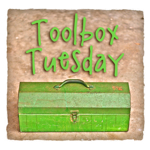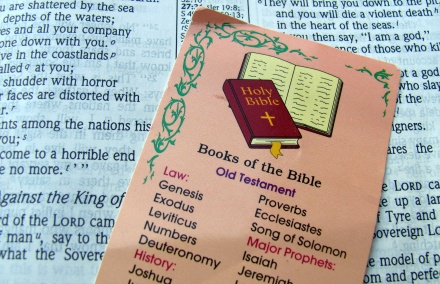 I stayed in a hotel last week. I wanted to know the weekend’s weather. But I couldn’t find The Weather Channel.
I stayed in a hotel last week. I wanted to know the weekend’s weather. But I couldn’t find The Weather Channel.
So I had to laboriously flip through the channels, one by one, until I found it.
Do you ever drive through a new city but can’t find a radio station you want? Or go to your library but can’t locate Juvenile Biographies?
Or been asked to read Micah 6:8 aloud in Sunday School, but you can’t find it (it’s after Jonah, before Nahum)?
Just how well do we know the bones of our Bible?
 But this is 2011, we whine. My Bible is on my iPhone; I look up a verse by typing in the name.
But this is 2011, we whine. My Bible is on my iPhone; I look up a verse by typing in the name.
Or I can google a few key words and find the scripture I need. Or if I have to, I can always flip to the Table of Contents in my hardcopy Bible.
Who needs to memorize the books of the Bible anymore?
We do!
And now as much as ever.
When we trade in our human memory for a digital one, we lose advantages of knowing our way around a Bible.
Why learn the bones?
1. See the big picture
Without knowing the overall skeleton, you can lose sight of the central theme of God’s consistent love that holds the Bible together. When you work a jigsaw puzzle, you look at the picture on the box first–and often, then you put the edge pieces in place for its structure.
2. Delight in details
But while the Bible is one big love story about God, it’s also a series. Many smaller stories are captured in its 66 individual books. Each story holds value. By keeping books in context (Song of Solomon is a book of poetry; Ezekiel is a major prophet), you can more accurately interpret what you’re reading and can better apply it to your life.
3. Look for help
Once you know the general order of the books, you can look more efficiently for specific helps. If you have a friend in deep mourning, direct her to the Psalms for comfort. Or if you’re struggling with a child’s rebellion, turn to Proverbs for wisdom. Be prepared for opportunities.
4. Use it easier
The more familiar you are with the books (Luke come before Acts), the easier it is to find your way around. You’ll be less frustrated when looking up verses to share and you’ll waste less time in your studies.
5. Find your story
Will you be more Christlike by memorizing the books of the Bible? Probably not. But the more you know the book, the more you’ll know the Author. And you’ll discover easier how he wants YOU to participate in the story.
Where to start
Begin with the big bones. Memorize how the library is set up: two main divisions (Old and New Testaments), then subdivided into smaller sections (books of Law, books of History, etc). While these are man-made categories, they’re still helpful in interpreting that poetry books are more metaphorical, for example, and that Pauline epistles are doctrinally-rich and very practical.
Then, if you haven’t already, memorize all 66 books. It’s not too late. And it’s not that difficult (music helps greatly!).
To go even deeper, learn a summary from each book; read more about the approximate 40 authors; put together a timeline.
God has breathed life into the bones of the Bible.
It’s his book for our lifetime.
Let’s put it in our heart for eternity.
“For where your treasure is, there your heart will be also.”
Matthew 6:21
Resources
Some of my favorites:
Bible Gateway – a searchable online Bible in over 100 versions
E-Sword – free downloadable Bible study software
Katie’s top 10 online Bible study tools
66 Love Letters by Dr. Larry Crabb
What the Bible Is All About for Young Explorers based on the classic by Dr. Henrietta Mears
Reproducible Maps, Charts, Time Lines & Illustrations by Gospel Light
How familiar are you with the overall structure of the Bible?
Are you teaching your children the books of the Bible?
What’s your favorite Bible study resource? Please share!

Excellent post. I’ve used online sources so much I fear I am beginning to lose the edge I once had in knowing where things were, and I don’t want that to happen.
I use BibleGateway most often, but if they have Strong’s numbers there, I haven’t found them, so I go to crosswalk.com to look for the Strong’s numbers and click on them to find original Greek and Hebrew words and definitions.
Barbara,
One reason I love using E-Sword is because of their references to Strong’s numbers and their Greek and Hebrew lexicons. It’s so convenient when everything is in one place.
And yes, with digital resources, it is easy to lose our edge. I just type in the book/chapter/verse, and poof!, there it is for me with no flipping through or even seeing before/after verses for context. It’s a great thing but can also be a crutch if we’re not watchful to keep up our skills.
We try to teach the books of the Bible to our 5th grade Sunday School class, because more and more they just look up verses on an app (which is still good!) but they aren’t gaining the visual cues of connecting where things are in the Bible.
Oooh, looking forward to reading the resources from that list! Thanks for sharing!
Katie,
That’s how I felt when you posted your top 10 online study tools. I had never even heard of Theopedia. And I’m always glad to see “Desiring God” website promoted because it is so rich with information and so FREE with its resources. I often go there to look up what I’m studying by using their scripture index (so handy!).
I’m praying today for good reception of your and Lara’s eBook. I know it will bless many as another useful tool in our toolbox.
Lisa,
Great post! We learn the books by singing songs, and it’s amazing how it sticks. Of course, I have them recite them without music, too. :) Thank you for the summary link…what a great idea to memorize that as well. I love your passion for His Word and your desire to encourage others to dig in for themselves. Much love to you!!
Trisha,
I still often sing the song (I try to keep it in my head, ha) when I’m flipping through Old Testament books that I don’t use very often.
Learning through song really makes a difference for me and makes things so sticky. I remember my children singing the songs of the books of the Bible when they were young; the names would barely make sense, but they were getting the rhythm down nonetheless of where each book belonged.
Learning with kids has been such a huge incentive for me. Whatever I encourage them to memorize, I know I better memorize too. :-) I know you’re doing a great job of that with your own kids. And yes, YOU do inspire me in so many ways. Love you too.
I just started teaching a second and third grade Sunday School class at my church and I’m THRILLED that our curriculum has us going through the entire Bible this year, book by book.
It’s a bit of a squeeze to get 66 books into about 36 weeks (Can anybody say “major understatement”?), but the big picture view of the Bible is totally worth it.
I didn’t have access to the song I sang when I learned the books of the Bible, so I’m using a different one. I’m finding it to be *very* interesting to singing the same lyrics (with slight variations) to a completely different tune!
Rebekah,
I’m jealous that my daughter helps with a kindergarten class with our homeschool group that does the “Walk through the Bible” chant each week. Are you familiar with that?–it’s a timeline of Old Testament events set to hand motions. We learned it at a seminar with our church, but I have forgotten most of it because I don’t repeat it often enough.
I’m sure you’ll be a wonderful guide through the 66 books in 36 weeks. Yes, a big task. Our 5th graders sing the books of the Bible to a different tune than I learned also. I keep wanting to teach them MY version. Ha. But instead I’m trying to learn their version, so I feel your pain.
Great post!
I am teaching my kids the books of the Bible using Walk Thru the Bible’s Key Word system… flash cards (there is also a CD rom available) that use a funny cartoon to help remember the name of the book and also the theme of the book. It is a great resource for adults or children… it is awesome to hear my 4 year old say the book of Leviticus is about offerings and feasts and my 6 yro and 7 yro go through the 5 stages of the 7 cycles of Judges. I wish I had learned all that as a kid!!!
Here’s a link to the cards in the WTB store.
http://estore.rrd.com/WalkThruTheBible/product.aspx?id=178
Rusheika,
I followed your link and you’re right; it looks like an amazing resource for either kids or adults. Thanks for sharing!
I remember learning a song about where the books of the OT and NT are. I still use it occasionally, but don’t remember it as well as I use to. I do know general areas of books, so that makes it easier.
Katie,
I looked up several Bible book songs on YouTube to try to find the one that I learned as a child, but could never find that version. Maybe it’s outdated? At least the lyrics don’t change. ha.
YouTube did have several options though, some better than others, if anyone would like to hear it through song….
What a good illustration. And it is so important. First to learn it young while our minds are fresh and we can memorize easier. And to put an importance on it. I want to stay in it so I can go to that certain verse for the help I need. One thing I have found that I love to do in Bible study is to make notebooks with my own concordance. If it is a verse or quote on the heart or sin or peace etc. I put it on that page I have made. Helps give me a roadmap.
Brenda,
I am thankful that I learned a lot of “bones” when I was young because you’re right–it is harder the older you get. Possible, but harder.
I love your idea of making your own concordance! That takes a lot of self-discipline on your part, but I’m sure the rewards are well worth it. It gives you such a personalized collection of scriptures to look back on and to share. Fantastic.
Great post, Lisa. It absolutely helps. I need to work on memorizing the OT books. I love mnemonic devices and song to help memorize too. One silly device that helps me remember the order of the NT letters Galatians, Ephesians, Philippians, Colossians is G.E.P.C. = God Eats Pop Corn. Silly, I know, but it works! I can’t remember where I heard that phrase. :-) My son loves music, so I imagine he’ll memorize much through song as he gets older.
Caroline,
Aren’t mnemonic devices the best? Thanks for passing along G.E.P.C. I’ll try to remember that one. I remember that 1 & 2 Thessalonians, 1 & 2 Timothy, and Titus are 5 T’s in a row, all in alphabetical order. :-)